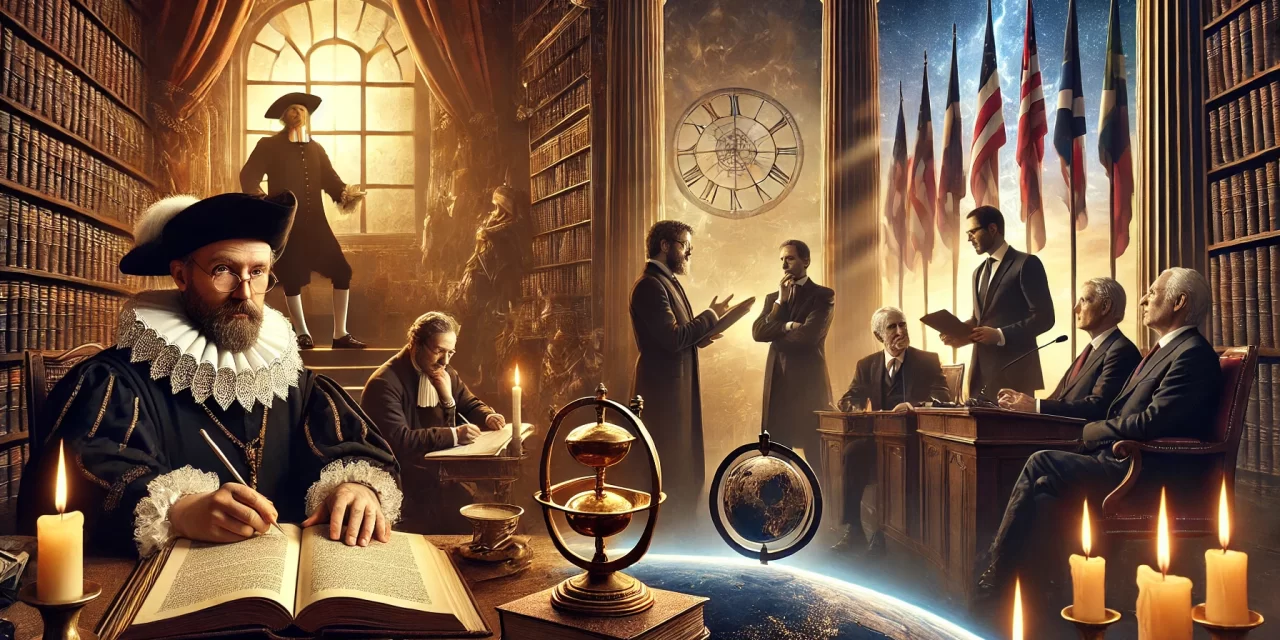Introduction: The Unfinished Journey of Western Thought
The great thinkers of the Scientific Revolution and the Enlightenment sought to challenge the constraints of their time. Whether questioning the dominance of religious dogma, dismantling the divine right of kings, or developing methods to understand the natural world, they worked to replace ignorance with reason, autocracy with democracy, and dogma with open inquiry. The ideas they championed reshaped the modern world—but they were never static, nor were they without unintended consequences. Today, as we examine our ecological, social, and technological crises, we should not only recognize what these thinkers accomplished but also how their ideas evolved—and in some cases, where they have failed us.
This document serves as a bridge between the past and the present, exploring how the key Enlightenment and Scientific Revolution principles have unfolded over time, where they have succeeded, and where they have led to new challenges that demand further evolution.
1. Scientific Rationalism: The Power and Limits of Knowledge
What They Did and Why
Thinkers such as Francis Bacon, René Descartes, Galileo Galilei, and Isaac Newton sought to understand the world through observation, reason, and mathematics rather than inherited authority or superstition. Bacon formalized empirical experimentation, Descartes introduced rational deductive reasoning, and Newton provided the universal laws of motion and gravity—together forming the foundations of modern science.
What Has Happened Since
- The Successes: The scientific method has led to extraordinary advancements in medicine, technology, and physics, from space exploration to genetic engineering.
- The Challenges: The triumph of mechanistic, reductionist thinking created a fragmented worldview that isolated disciplines from one another, sidelining holistic or relational knowledge systems.
- Unintended Consequences: Science became entangled with industrial and military interests, producing tools of destruction (atomic bombs, bioweapons) alongside breakthroughs that enhance human life. The belief in science as an inherently neutral force ignored the ethical responsibilities of knowledge.
2. Rule of Law: Protecting Rights, But Protecting Wealth Too
What They Did and Why
Early legal frameworks were designed to constrain tyranny and protect citizens from arbitrary rule. The Magna Carta (1215), John Locke’s ideas on governance, and Montesquieu’s separation of powers all sought to prevent unchecked power. The development of constitutional law helped enshrine individual rights.
What Has Happened Since
- The Successes: The rule of law became a cornerstone of democratic governance and was used to expand human rights (e.g., abolition of slavery, civil rights protections). International legal frameworks like the United Nations sought to apply these principles globally.
- The Challenges: Laws remain unequally enforced—those with wealth often shape legislation in their favour, leading to corporate influence over governance and legal protections that prioritize property rights over human rights.
- Unintended Consequences: The idea of law as a neutral force obscures its role in maintaining systemic inequalities. Many legal systems remain tied to colonial-era power structures, benefiting certain groups at the expense of others.
3. Freedom of Thought and Expression: From Censorship to Algorithmic Manipulation
What They Did and Why
The Enlightenment thinkers Voltaire, Diderot, and John Stuart Mill fought against censorship, religious persecution, and intellectual suppression. Their work laid the foundation for freedom of speech, freedom of the press, and academic inquiry.
What Has Happened Since
- The Successes: The proliferation of books, journalism, and digital communication has allowed for greater access to knowledge and more robust public discourse.
- The Challenges: In the digital age, algorithmic curation by corporations (Google, Facebook, TikTok) has introduced a new form of censorship—one shaped not by governments but by market incentives.
- Unintended Consequences: Instead of state-imposed censorship, we now face information bubbles, misinformation, and media manipulation, where powerful entities control what we see, believe, and discuss.
4. Democratic Accountability: The Rise and Weakening of Representative Government
What They Did and Why
Thinkers like Rousseau and Montesquieu critiqued hereditary monarchy and proposed systems of popular sovereignty and separation of powers. The American and French Revolutions enshrined the idea that government should be accountable to the people.
What Has Happened Since
- The Successes: Representative democracy spread across the world, challenging authoritarian rule and offering citizens a say in governance.
- The Challenges: Low voter participation, corporate lobbying, and political disillusionment have led to a weakened sense of civic engagement.
- Unintended Consequences: The focus on majority rule has sometimes led to the tyranny of the majority, where the rights of minorities are overlooked. Short election cycles discourage long-term governance, leaving critical issues like climate change under-addressed.
5. Market Innovation: From Wealth Creation to Ecological Overshoot
What They Did and Why
Adam Smith championed the power of free markets to drive prosperity and replace monopolistic, state-controlled economies. The industrial revolution brought rapid economic expansion, raising global living standards.
What Has Happened Since
- The Successes: Market economies fuelled innovation, entrepreneurship, and lifted billions out of poverty.
- The Challenges: The emphasis on infinite growth on a finite planet has led to climate change, resource depletion, pollution, biodiversity loss and extreme inequality.
- Unintended Consequences: Financial markets now dominate productive economies, rewarding short-term speculation over long-term well-being.
6. Individual Liberty: From Freedom to Social Fragmentation
What They Did and Why
The Enlightenment emphasis on individual rights—advocated by John Locke, Mary Wollstonecraft, and Kant—was a response to oppressive religious and political hierarchies. It sought to secure personal freedoms and autonomy.
What Has Happened Since
- The Successes: Civil rights movements expanded personal freedoms, allowing for greater diversity and self-expression.
- The Challenges: The prioritization of radical individualism over community responsibility has led to social atomization, loneliness, and political fragmentation.
- Unintended Consequences: Freedom without relational responsibility has eroded social trust—making collective action for the common good more difficult.
Conclusion: The Need for a New Phase of Intellectual Evolution
The thinkers of the Scientific Revolution and the Enlightenment responded to the crises of their time by questioning assumptions and proposing systemic change. While their ideas have reshaped the modern world, they have also revealed new blind spots and unintended consequences.
We now face ecological and social crises that demand the same courage to rethink our inherited frameworks. Just as the Enlightenment thinkers sought to improve upon the past, we should now expand our understanding of justice, knowledge, and human flourishing in ways that align with the realities of the 21st century. The next stage of intellectual progress will not discard these ideas but will complete their unfinished work.
Terry Cooke-Davies
16th February 2025
Profound thanks to ChatGPT(4o) from OpenAI for assistance with this article.






